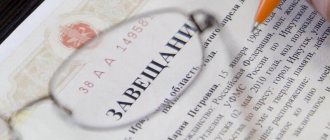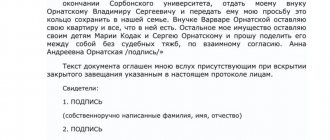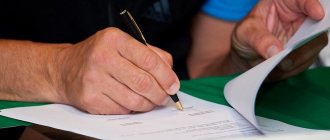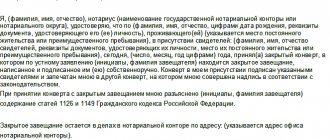People who own property (including real estate) often think about how to draw up a will without a notary so that it has legal force. This question arises when it is impossible to visit a notary’s office. The law provides that a citizen has the right to write an order without a notary certificate. But such paper has special requirements that must be taken into account. An incorrectly executed document can be easily challenged in court and declared invalid.
Why do you need a will?
To dispose of personal property after death at your own discretion, you need to prepare a will in advance. According to the law, property is usually transferred to close relatives, but if you draw up a written statement of will, you are allowed to transfer assets to third parties (friends, colleagues, lovers).
In this case, you need to know whether you need to contact a notary’s office or you can draw up an order at home. To answer this question, you need to understand the purpose of the expression of will and the legal requirements for the document.
Purposes of writing the paper:
- determination of the circle of persons who are entitled to issue an inheritance;
- compiling a list of property that is due to successors;
- inclusion of a friend, colleague, acquaintance or stranger among the heirs (the third party does not need to prove the existence of family ties with the deceased, it is enough to provide a copy of the last will of the deceased);
- determining the share of each claimant to the inheritance.
To dispose of one’s property, a minimum number of requirements are put forward to a citizen. The main thing is that the person is of age and capable. An individual aged 16 years who is officially employed or married can also draw up a document.
To draw up the paper, you only need a passport. In rare cases, you will need a certificate confirming the citizen’s legal capacity. You should also provide information about the heirs, but their passports are not required, the data is dictated by the testator.
A will without a notary is drawn up at your own request. If it can be confirmed that the testator was forced to write the document, then the document is considered invalid. The main requirements for the testator are a clear mind and full awareness of what is happening. A notary will not accept the will of a drunk or drugged person.
The order must be drawn up by one person on his own behalf. But at the same time, this person has the right to write several statements of will at once. So, in one document it is written down who the house is assigned to, in the second - a car, in the third - a testamentary refusal (the successor is assigned responsibilities associated with a third party).
The composition of the order is kept secret, information is not disclosed to people who did not participate in the execution of the paper. After the death of the testator, the act of the deceased’s last free will is read out. You can challenge a will in court by proving the incapacity of the deceased, the absence of special circumstances, the presence of pressure on the citizen, etc.
The order does not deprive relatives of their obligatory share. This portion is due to people who are temporarily or permanently unable to engage in labor activity: young children, dependents, disabled partners, etc. Also, a widow or widower cannot be deprived of a marital share (50% of property acquired jointly during marriage).
Persons entitled to certify a will
A will is an official document that is drawn up directly by the applicant in printed or written form and comes into force once it is certified by a notary.
Therefore, having decided to distribute property in advance, a person turns to a lawyer who helps to correctly draw up the paper and certifies it. But there are situations when it is impossible to act according to this algorithm.
In such a situation, it is necessary to be guided by Article 1129, which explains the procedure for drawing up a will in emergency, unforeseen circumstances, as well as Chapter 62 of the Civil Code of the Russian Federation, which talks about the right of inheritance by will.
Articles 1125, paragraph 7, 1128, paragraph 2 and 1127, which refer to persons authorized in situations provided for by law to testify to wills, are also important. It can be:
- the chief physician of a healthcare institution or his deputy for medical affairs.
- a doctor who is currently on duty (the department doctor on duty is not vested with these powers);
- captain of a long-distance ship belonging to the Russian Federation;
- in prison - the head of the colony;
- in the army - unit commander. He can certify documents of both the employees themselves and their family members, as well as civilians who work in a military unit.
- head of an exploration or Arctic expedition;
- if the testator is in a home for the elderly or disabled, the document can be certified by the chief physician, head or director of the institution.
However, it is worth considering the fact that these persons can certify a will only in cases where the testator is in danger and it is not possible to call a notary. At the first opportunity, the witness is obliged to transfer the written document to the notary.
You can read about the cost of registering a marriage contract here.
Who can be a testator
According to current legislation, only legally capable citizens have the right to make a will for an apartment and other large objects. The notary or other representative of the notary who performs the relevant functions is convinced of this. If external signs cause suspicion, then a certificate confirming the citizen’s legal capacity is required.
Who can make a will without a notary:
- adults who are over 18 years of age;
- men or women who have reached the age of consent (16 years) and who are married or employed.
Persons with mental disorders cannot freely dispose of their property. A will is invalid if a doctor diagnoses diseases that affect the mind. There are also milder forms of pathologies and addictions, due to which a person becomes limited in capacity, and therefore cannot independently dispose of personal assets and draw up a statement of will.
The rights of a citizen are limited only by the court. To do this, relatives or other interested citizens must draw up a corresponding application. The legal capacity of a person is restored in a similar manner after collecting the necessary evidence.
Is it possible to write a will without a notary?
Let's consider whether it is possible to draw up a will without a notary. The law allows you to write a document on your own without leaving your home. The main thing is to certify the paper. To do this, you still have to go to a notary or other authorized persons who can certify the last expression of will.
To prevent a will without a notary from being recognized as fictitious in court, it is recommended to contact a legal entity. But sometimes it is impossible to achieve your plans. For example, these are situations when there are no notaries or other authorized persons in the places where the testator resides.
Special cases include situations in which the health of the testator is at risk. If there is no way to get to a notary’s office, then the will is allowed to be certified by other persons in the presence of witnesses (people who do not show interest in receiving the deceased’s inheritance are selected).
Who performs the duties of a notary:
- representatives of local government authorities who are closest to the testator and officially replace the notary;
- heads of various expeditions (if at the time of drawing up the will the person is traveling);
- captains of water vessels;
- the head of the hospital or the medical worker on duty (if the citizen’s health condition is serious and there is no possibility of contacting a notary);
- the head of the prison (if the man or woman is in prison);
- director of public organizations where the testator stays (private boarding houses, health resorts where the testator is undergoing treatment, etc.);
- senior in rank when the testator is serving military or contract service.
A notary is not required when distributing a bank deposit to an inheritance. The act of final free will will be certified by an employee of the financial institution.
Is a will valid, not certified by a notary, written by hand?
In unforeseen cases, a handwritten document is drawn up indicating the final wishes of the copyright holder regarding the distribution of personal assets. When receiving such a document, relatives do not understand whether a will that is not certified by a notary has legal force.
If the registration rules are followed, all the details are spelled out, the urgency of the conditions is proven, the contents of the paper are carried out. The act is also considered in the presence of direct or indirect danger - emergency cases, serious illness, fatal injury, etc.
The question often arises whether a will that has not been certified by a notary is valid if there is no such specialist in the area where the testator lives. This document is taken into account when dividing the property of the deceased, but only for 1 month.
Often, uncertified orders are challenged in court and the heirs have to prove that the testator wrote the document of his own free will. Writing a will by hand does not require much time or special skill. But it is important to understand that the legal validity of such a document is in doubt and the successors may have problems receiving an inheritance under a will.
To whom can you leave an inheritance under a will?
You can bequeath property (in whole or in parts) to anyone:
- to a relative, friend or stranger;
- one person or several;
- citizens of another country;
- organization (for example, a library or academy);
- to the state.
Just in case, you can indicate a “spare” heir in the will if, for any reason, the “main” heirs cannot accept the inheritance - for example, they die before the opening of the will or abandon the property.
How to make a will without a notary: sample
You can draw up your last statement of will yourself while at home. If you plan to certify the order, it is better to prepare a printed copy. In emergency situations, a handwritten document must be drawn up. A sample will drawn up independently in unforeseen conditions must necessarily include the following information:
- Date of writing and location of the copyright holder.
- Full name of the testator and the person(s) to whom he assigns his property.
If for some reason the testator cannot draw up a document on his own, then this is done by a notary, who writes down all the information dictated by the client. At the end of the sheet it is indicated that the information is drawn up from the words of the testator, the grounds for such an action are described and the citizen puts his signature.
The testator must re-read the text. If he cannot do this for health reasons, then the notary will read the paper. Such an action is also indicated by a corresponding note in the will indicating the reasons.
When the document is ready, it needs to be certified. The sheet is signed by representatives of the notary. When filling out the document yourself, the paper is certified by two invited witnesses. The notary puts a stamp, which indicates special powers.
If the testator is illiterate or his state of health does not allow him to sign on his own, then this is done by a handicapper. He is a capable citizen who does not claim inheritance. In addition to affixing a signature, the person applying the hand indicates his last name, first name, patronymic and residential address.
Design rules
Under normal circumstances, a person must come to a notary or call a specialist to his home. You are allowed to write a will in advance yourself or entrust this work to a professional. By providing personal data, you agree to its processing. It is required to make two copies of the document.
The notary explains the legal provisions to the testator, checks the paper, puts his signature and seal. In emergency situations, the procedure is different, but there are document writing requirements that should be considered.
Rules for drawing up a will yourself:
- The signatures of all people present at the conclusion of the act of unilateral will are required - the testator, a representative of the notary, two disinterested witnesses (it is prohibited to invite potential successors for this procedure).
- The authorized person is obliged to send or take the paper to the notary's office when appropriate conditions arise.
- If a citizen wants to invite a notary to correctly draw up a declaration of will, then the authorized person must try to find a way to bring a specialist.
- The document precisely states the number of successors, as well as to whom and what part is allocated.
- The paper is written in the handwriting of the testator, which makes it possible to analyze the handwriting in the future and verify the originality of the will. The printed version casts doubt on the urgency of the situation that caused the current situation.
- The division of property, according to a handwritten order, begins when the judge confirms the authenticity of the document. A person interested in the property of the deceased has the right to file a claim.
Often, a handwritten will without a notary becomes the cause of a dispute between relatives, especially if expensive assets are inherited. To avoid conflict situations, the testator must comply with simple formalities, and then no one will be able to challenge the document.
Form
To avoid any questions about whether a will that has not been certified by a notary has legal force, it is necessary to draw up an order using a template and write down the necessary details. Thus, the citizen enters the name of the document, the date and place of writing, and also indicates his personal data. Then the property is listed, which after the death of the testator is distributed among relatives.
Next, information about the successors is indicated - full name, home addresses. Then it is written down how many copies of the orders have been made, and it is indicated that the text was written by the testator (or from his words). At the end, the citizen signs.
Content
If you write an order in emergency conditions, then you are allowed to adhere to a free form of presentation. But there are rules on how to write a will without a notary, which are observed in all conditions.
Requirements for the content of the order:
- the amount of inheritance and the portion that is due to each successor are strictly prescribed;
- the absence of points in the specified information that contradict each other;
- clear and readable text, without slang and obscene statements.
If you go to a notary, he will help you draw up a document according to the sample. But in unforeseen cases there is no time to look for an example, so a free form of presentation is accepted.
Sample will without a notary
Size: 9 KB
Documentation
The necessary documents are required both for self-registration and for a visit to the service. The exception is emergency cases in which there is no time to prepare papers. In other circumstances, the testator must provide a passport or other identification document, which includes military ID cards, international passports, residence permits, etc.
The notary has the right to request a certificate proving the identity of the testator. A citizen may refuse to provide a medical report. But in this case, the authorized person will not certify the will, and claimants to the inheritance will have grounds to challenge the last will of the deceased.
It is also necessary to have documents confirming the identity of witnesses and other people present when writing the will. In addition, they may be required to provide a certificate confirming their legal capacity.
The testator is not required to prove ownership of real estate and movable assets that he plans to give to his successors. A lot of time passes before the savings are divided, so the safety of the property may suffer.
State duty
If you make a will yourself, you can save money, but you won’t be able to completely rid yourself of expenses. Citizens who write their last will in unforeseen situations are exempt from taxes. In all other cases, you will have to pay a state fee, as well as pay for notary services.
The state tax is only 100 rubles. The help of a notary will cost much more. Each year the Chamber of Notaries sets fixed amounts. In any case, you will have to pay from 1000 to 2000 rubles.
Extraordinary circumstances
A will without a notary is valid if it is drawn up in emergency conditions. The legislation does not stipulate which situations are considered emergencies. But experience has determined that these are special cases in which a person cannot come to a professional, and his life and health are in danger.
The reasons for such situations are not taken into account; attention is paid only to the presence of a problem and to the freedom of action of the testator (if he was forced to draw up a document, the court will invalidate it). A will without a notary is valid for only a month. If the person managed to survive, then he needs to go to a notary and have the paper certified, otherwise the order will be cancelled.
If a citizen has died, then the validity of the will is defended by the heirs of the deceased. To do this, you will have to prove the presence of emergency conditions that did not allow the deceased to contact the authorized service. The document must be drawn up only at your own request without outside pressure, which must also be confirmed.
If the judge recognizes the will of the testator as valid, then the division of property begins in the manner specified in the will. When the authenticity of the order is not proven, the assets are distributed according to the law.
In what cases can a certified document be challenged?
There are several ways to make a will:
- Using the services of a notary. Moreover, the place where it is compiled can be anywhere: at home, in a hospital, in a notary office.
- Do it yourself without involving a notary. The presence of several disinterested witnesses is required.
- In emergency situations that threaten the life of the testator.
- Certification by officials who are authorized to do so.
Of all the methods, the most reliable is the option of drawing up and certification by a notary . But this method does not provide a 100% guarantee. You can challenge a will if:
- its compiler will be declared incompetent;
- when drawing up a document under pressure or deception;
- the form of the will does not comply with the requirements;
- there were no required witnesses when the closed will was executed.
Reasons for challenging a will.








